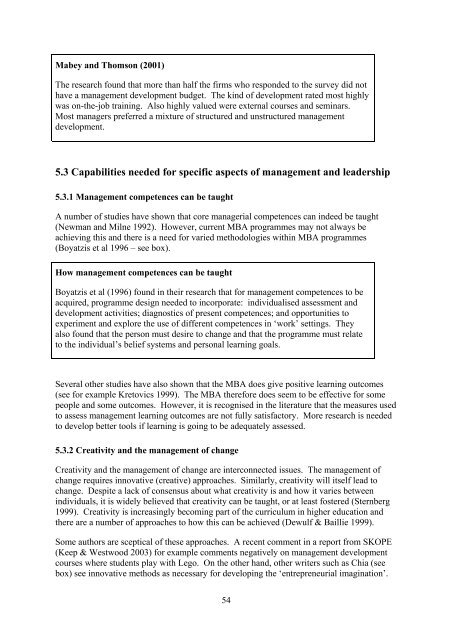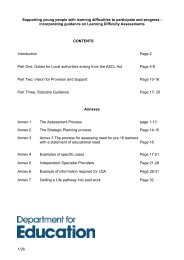The Development of Management and Leadership Capability and its ...
The Development of Management and Leadership Capability and its ...
The Development of Management and Leadership Capability and its ...
Create successful ePaper yourself
Turn your PDF publications into a flip-book with our unique Google optimized e-Paper software.
Mabey <strong>and</strong> Thomson (2001)<br />
<strong>The</strong> research found that more than half the firms who responded to the survey did not<br />
have a management development budget. <strong>The</strong> kind <strong>of</strong> development rated most highly<br />
was on-the-job training. Also highly valued were external courses <strong>and</strong> seminars.<br />
Most managers preferred a mixture <strong>of</strong> structured <strong>and</strong> unstructured management<br />
development.<br />
5.3 Capabilities needed for specific aspects <strong>of</strong> management <strong>and</strong> leadership<br />
5.3.1 <strong>Management</strong> competences can be taught<br />
A number <strong>of</strong> studies have shown that core managerial competences can indeed be taught<br />
(Newman <strong>and</strong> Milne 1992). However, current MBA programmes may not always be<br />
achieving this <strong>and</strong> there is a need for varied methodologies within MBA programmes<br />
(Boyatzis et al 1996 – see box).<br />
How management competences can be taught<br />
Boyatzis et al (1996) found in their research that for management competences to be<br />
acquired, programme design needed to incorporate: individualised assessment <strong>and</strong><br />
development activities; diagnostics <strong>of</strong> present competences; <strong>and</strong> opportunities to<br />
experiment <strong>and</strong> explore the use <strong>of</strong> different competences in ‘work’ settings. <strong>The</strong>y<br />
also found that the person must desire to change <strong>and</strong> that the programme must relate<br />
to the individual’s belief systems <strong>and</strong> personal learning goals.<br />
Several other studies have also shown that the MBA does give positive learning outcomes<br />
(see for example Kretovics 1999). <strong>The</strong> MBA therefore does seem to be effective for some<br />
people <strong>and</strong> some outcomes. However, it is recognised in the literature that the measures used<br />
to assess management learning outcomes are not fully satisfactory. More research is needed<br />
to develop better tools if learning is going to be adequately assessed.<br />
5.3.2 Creativity <strong>and</strong> the management <strong>of</strong> change<br />
Creativity <strong>and</strong> the management <strong>of</strong> change are interconnected issues. <strong>The</strong> management <strong>of</strong><br />
change requires innovative (creative) approaches. Similarly, creativity will <strong>its</strong>elf lead to<br />
change. Despite a lack <strong>of</strong> consensus about what creativity is <strong>and</strong> how it varies between<br />
individuals, it is widely believed that creativity can be taught, or at least fostered (Sternberg<br />
1999). Creativity is increasingly becoming part <strong>of</strong> the curriculum in higher education <strong>and</strong><br />
there are a number <strong>of</strong> approaches to how this can be achieved (Dewulf & Baillie 1999).<br />
Some authors are sceptical <strong>of</strong> these approaches. A recent comment in a report from SKOPE<br />
(Keep & Westwood 2003) for example comments negatively on management development<br />
courses where students play with Lego. On the other h<strong>and</strong>, other writers such as Chia (see<br />
box) see innovative methods as necessary for developing the ‘entrepreneurial imagination’.<br />
54
















